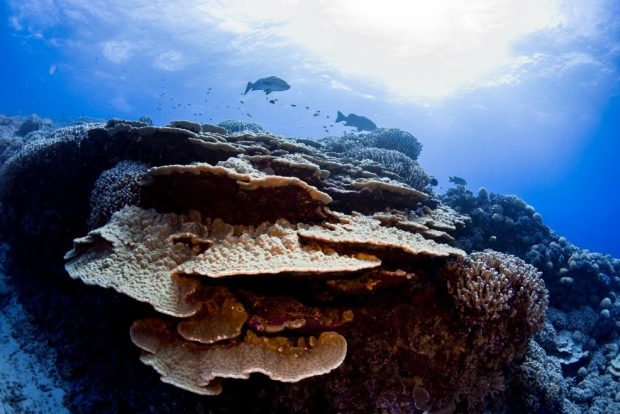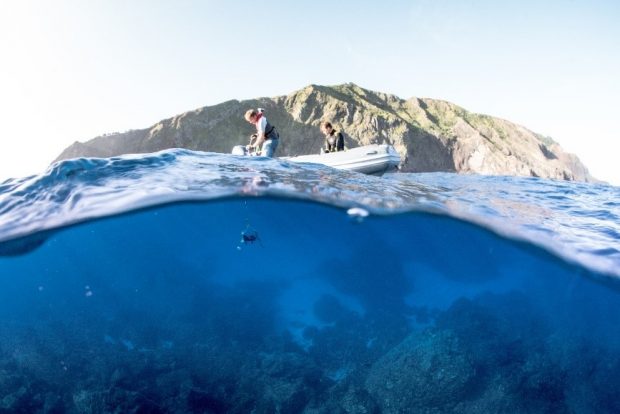On 18 August, the Blue Belt Programme team and UK Overseas Territories (OTs) representatives shared their challenges and achievements at the 6th International Marine Conservation Congress (IMCC6). The conference – originally planned to take place in Kiel, Germany - was moved to online due to COVID-19 restrictions.
The IMCC is seen as the most important international event for anyone involved in marine conservation. The meeting is the Society for Conservation Biology Marine Section’s main event and is held every two years, all themed on ‘making marine science matter’.
Influential Conference
With over 1,000 marine conservation professionals, policy makers and journalists registered to watch the presentations, this was an ideal opportunity to highlight the impressive work being carried out to enhance marine protection in the UK’s overseas territories supported by the UK government’s Blue Belt team.
Before the presentations had begun the day got off to a great start when the Rt Hon Lord Goldsmith, Minister of State in the Foreign and Commonwealth Office, highlighted the conference on social media, and the support the UK government – via the Blue Belt Programme – is giving to protect the unique marine ecosystems and endemic species of the OTs.

The First Session
First up for the morning session was Head of the Blue Belt Programme, Marine Management Organisation’s (MMO) Jo Stockill, who shared the Programme’s successes, challenges and lessons.
Jo said, “Looking back over the last four years brought into very clear focus exactly how much the programme has already achieved, but it also highlighted the challenges we have faced and continue to face in safeguarding our marine environment. The partnership work with the UK Overseas Territories has been at the heart of the programme’s achievements.
“It was a great opportunity to be able to share our four-year journey with so many influential people within marine conservation.”
Jo was followed by MMO colleague, Katie McPherson, Head of Blue Belt’s compliance and enforcement team, who gave an overview on the cost-effective, innovative approaches being taken to tackle illegal fishing. These included the use of unmanned aerial vehicles or drones, which were trialled to support both the collection of ecological information and to support patrol vessels.
Stephanie Martin, the Government of Tristan da Cunha’s Environmental and Conservation Policy Officer, shared their journey in developing a marine protection strategy for the world’s most remote inhabited island. Tristan is rich in marine biodiversity and the Programme has supported projects with the Fisheries and Conservation Department, which have included training, fisheries reviews, scientific equipment, the refurbishment of a patrol vessel, two scientific research cruises and several workshops.
This work will help to inform the local community’s decision-making on its marine protection scheme.
The session concluded with the UK Foreign and Commonwealth Office’s Liz Clingham, Blue Belt Programme coordinator for St. Helena, providing an insight into how big ocean surveys on the territory are informing local management and community engagement. This increased understanding of the marine environment has helped revise existing marine management strategies and the creation of evidence-based monitoring programmes.
Liz said, “It was a real pleasure to be able to present on behalf of St. Helena at this conference. Presentation style was a little out of my comfort zone and caused many headaches, but we did it! Nevertheless, it was an opportunity to showcase how small little islands in the middle of “nowhere” are benefiting from the Blue Belt Programme and an opportunity to display our enthusiasm and ambitions on the worlds platform raising our profile – thank you IMCC for continuing with the conference during these uncertain times.”

Second Session
The second session saw Mark Belchier, Director of Fisheries and Environment for the Government of South Georgia and the South Sandwich Island (SGSSI), give a talk co-authored by Chris Darby, Principal Marine Ecology Scientist at the Centre for Environment, Fisheries and Aquaculture Science (Cefas), on managing the impact of longlining on the seabed habitats in SGSSI. Mark highlighted a Blue Belt Programme-funded project to assess the use of longline mounted equipment on benthic organisms. This included fishing vessels deploying cameras, temperature loggers and movement sensors at fishable depths throughout the region.
Mark said, “It was great to be able to showcase the exciting research being undertaken under the Blue Belt Programme within the South Georgia and the South Sandwich Island marine protected area. The study uses an array of deep water camera systems and motion sensors to assess benthic biodiversity and aims to quantify the interaction of longline fishing with the seafloor and to assess the effectiveness of the marine protected area’s extensive no-take zones.”
Cefas’s Paul Whomersley, Senior Marine Advisor, discussed how evidence has been used to inform a range of marine management strategies. The OTs in the Programme differ environmentally but have the same requirement to develop and implement evidence-based protection strategies. Therefore, it has been essential to collect and communicate evidence, both scientific and socio-economic, to create a range of successful management approaches.
Diane Baum, Head of Fisheries and Conservation at Ascension Island Government provided the final presentation on whether the global benefits of large Marine Protected Areas (MPAs) can be made relevant to the local communities. Her presentation underlined that for the Blue Belt to be sustainable it must be owned, valued and defended by the island communities it encompasses, and that the MPA’s global benefits need to translate into recognition and reward for local communities.
Jo concluded, “This flagship programme is central to the UK government’s ambition to tackle the serious global problems of overfishing, species extinction and climate change. These sessions were a tribute to everyone who is working tirelessly to support that aim. There is no doubt that our participation showcased the great work we are all doing and our aspirations for future work. We hope it will also inform and influence others concerned with the marine environment.”